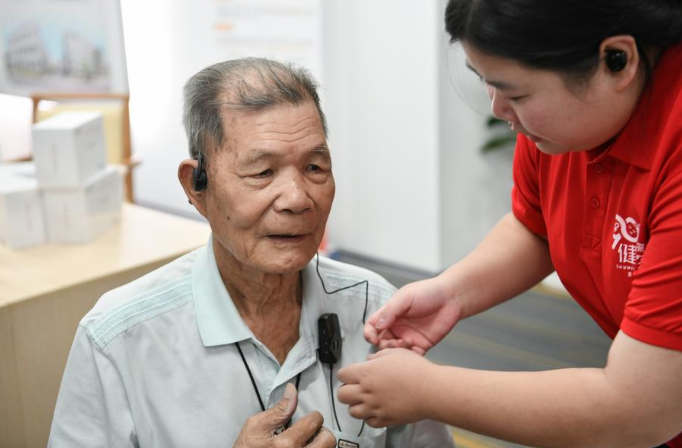
In a hearing aid store in Taiyuan, Shanxi Province, 70-year-old Zhang Wei had a happy moment. For years, he couldn’t hear his granddaughter’s voice clearly — but this time, he did. It was all thanks to an AI-powered hearing aid. “It’s like someone turned up the volume (音量) suddenly,” Zhang said. He is not alone; many elderly people in China are now using new AI hearing aids to get back to the world of sound.
China has about 27.8 million people with hearing problems, and the number is growing as more people get older. A hearing aid specialist named Cao Lijun said over 70% of their customers are 60 or older. To help these people, the government and companies are doing their part. China’s basic medical insurance pays for part of the cost of some hearing aids, making them cheaper for the elderly. Companies like Tencent also help — they work with an association (协会) to offer free hearing checks and AI aids in some cities.
With AI technology and government support, more elderly people can hear clearly again. Experts predict that future hearing aids will be even better: cheaper, easier to use, and just like eyeglasses that people can get and use easily.
1.1. How did Zhang Wei feel about the AI-powered hearing aid?
A Sad.
B Angry.
C Bored.
D Happy.
解析:选D。D 细节理解题。根据第一段第一句 “70-year-old Zhang Wei had a happy moment” 以及他描述感受的话语可知,张爷爷听清孙女的声音时处于开心的状态,而让他听到孙女声音的正是人工智能助听器。故选D。
2.2. Why does the writer mention Zhang Wei’s story?
A To tell family stories.
B To introduce Taiyuan.
C To bring in the topic.
D To sell hearing aids.
解析:选C。C 推理判断题。根据第一段内容,作者先讲述张爷爷靠AI助听器听清孙女声音的故事,随后引出“many elderly people in China are now using new AI hearing aids”这一主题。由此可推断,提及张爷爷的故事是为了引出下文关于AI助听器的内容。A 选项 “讲家庭故事”、B 选项 “介绍太原” 均偏离文章核心;D 选项 “卖助听器” 并非文章写作目的,文中未涉及销售意图。故选C。
3.3. What does Tencent do to help people with hearing problems?
A Pays all costs.
B Offers free checks.
C Trains specialists.
D Sells cheap aids.
解析:选B。B 细节理解题。根据第二段最后一句 “Companies like Tencent also help—they work with an association to offer free hearing checks and AI aids in some cities” 可知,腾讯会提供免费听力筛查。故选B。
4.4. What can we know about future hearing aids?
A They’ll be worse.
B They’ll be easier.
C They’ll be bigger.
D They’ll be rare.
解析:选B。B 推理判断题。根据最后一段第二句 “Experts predict that future hearing aids will be even better: cheaper, easier to use”可知,未来助听器会更易使用。A 选项 “会更差” 与 “even better” 相反,C 选项 “会更大”、D 选项 “会稀缺” 均未在文中提及,且与 “just like eyeglasses that people can get and use easily” 不符。故选B。
5.5. What is the main idea of the passage?
A AI aids help the elderly.
B Zhang’s happy moment.
C Tencent’s free service.
D China’s old population.
解析:选A。A 主旨大意题。通读全文,第一段用张爷爷的案例引出 AI 助听器,第二段介绍中国听力障碍人群现状及政府、企业的帮助,第三段展望 AI 助听器的未来。文章始终围绕 “AI 助听器助力老年人听清声音” 展开,核心是 AI 助听器对老年人的帮助。B 选项 “张爷爷的开心时刻”、C 选项 “腾讯的免费服务” 均为文章细节,D 选项 “中国的老年人口” 仅为听力问题增多的背景,均不能概括全文主旨。故选A。